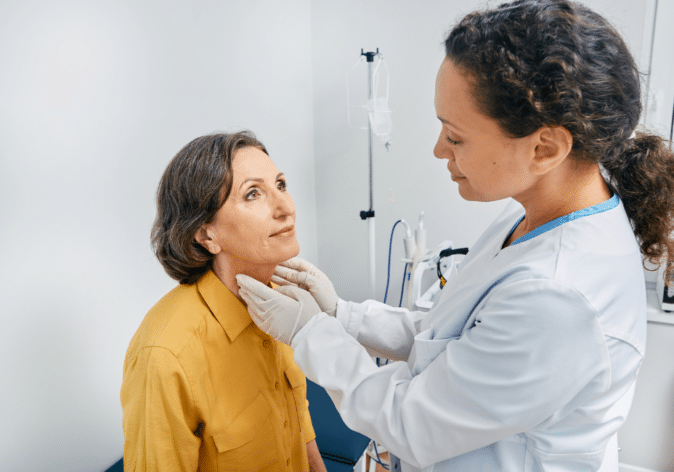SABCS 2018 Summary
Every year, thousands of academic and private researchers and physicians from over 90 countries gather for a five-day breast cancer symposium in San Antonio, Texas.
It’s an important conference for researchers who work in breast cancer, as it provides the latest research information from around the world, including breakthroughs in breast cancer clinical trials.
Several Breast Cancer Trials researchers were in attendance, including our Scientific Advisor, Dr Nick Zdenkowski. He sat down with us to provide a summary of the important research and announcements covered at the 2018 conference.
The Phase III KATHERINE Clinical Trial
The KATHERINE clinical trial was presented at the San Antonio Breast Cancer Symposium and simultaneously published in The New England Journal of Medicine. Dr Zdenkowski said the results garnered a lot of interest from those in attendance.
“It included patients with HER2 positive breast cancer who received neoadjuvant chemotherapy with trastuzumab or Herceptin. Some of these patients have a complete response, which means the treatment gets rid of all the cancer. They’ve got a really good prognosis. But for patients who don’t have a complete response, their prognosis is actually not very good.”
“What this trial did was randomly allocate patients to receive either ongoing Herceptin, which is standard of care, or T-DM1 which is a new HER2 targeted treatment, which we use for advanced HER2-positive breast cancer.”
Dr Zdenkowski said the results were very promising.
“They found the patients who received the new drug T-DM1, were less likely to experience a recurrent of their breast cancer in the future. There was actually a substantial and clinically important difference in the relapse rate; there was a reduced risk of developing invasive recurrence of the cancer or death by 50%. It’s something that, for a poor prognosis patient group, is really good to see.”
Many American based oncologists commented that they would immediately implement it in the clinic said Dr Zdenkowski, however Australia and New Zealand will have to wait.
“Because in Australia, firstly we need TGA approval. Secondly, we need PBS for the majority of patients, because it is an expensive drug. We can’t use it yet in Australia but hopefully it will come and ROCHE who make the drug will make the application.”
De-Escalation
Discussion and trials involving de-escalation have been occurring in Australia and New Zealand for quite some time. Dr Zdenkowski said it was good to see it was a large focus at the symposium.
“I was really interesting, because the US is a classic escalation situation. They always want to do more and more. We have got a couple of de-escalation trials, so it was quite useful to see that it’s breaking into the US market for trials like EXPERT. We had a trial in progress poster for the EXPERT trial, mainly to promote what we are doing and to show that we’re now starting to do trials on an international scale.”
He said a session on de-escalation, presented in a debate format and chaired by respected breast cancer researcher and clinician Eric Winer, was interesting.
“Debates can be difficult in medicine because there are always shades of grey. It needs to be fairly nuanced, but I think they did it well. The conclusion was, there are some patients who need more treatment like the KATHERINE study patients and there are some patients who need less, and we need to work out which patients they are. “
“There are patients, like TAILORx candidates, who would be considered for chemotherapy. But through the genomic test, they find out they are actually low or intermediate risk and therefore chemotherapy is not going to benefit them. This is similar to the EXPERT trial, for patients who are genomically low risk, we may find with that trial they don’t actually need radiotherapy.”
Dr Zdenkowski said the most difficult part of implementing de-escalation into patient’s treatment is communicating it to patients.
“Doing less is not something that patients take on that easily and oncologists probably need to think about how that is to be communicated to patients.”
Quality Of Life
Not all breast cancer research is focused on finding new treatments. Some researchers build on already existing treatments and prevention strategies to allow for a better quality of life for patients throughout their treatment and for years following. A number of quality of life researchers presented findings at San Antonio.
“There was a report about the quality of life benefits to breast conserving surgery. It showed that women who have a lumpectomy have a better quality of life than those who have a mastectomy. It’s symmetry (of the breasts), it’s not needing to think about having reconstruction later on.”
Another interesting quality of life study result presented was the use of a drug more commonly used for an overactive bladder to treat hot flashes.
“Women who have the most common type of breast cancer, hormone receptive positive breast cancer, almost always end up on some hormone blocking treatment and those hormone blocking treatments cause menopausal symptoms, hot flushes being the most significant one.”
“Hot flushes cause all sorts of secondary effects; breaks in concentration, sleep disturbance, worries about social events, alcohol can sometimes set it off, as can coffee, tea, chocolate and stress. Some women don’t want to go out in summer or out in public at all and that leads to some women stopping hormone blocking treatments which means their breast cancer is more likely to come back.”
“This research is looking at a new indication for a currently used drug called oxybutynin, which is used for problems with an overactive bladder. But it also has a potential affect on reducing hot flashes,” said Dr Zdenkowski.
“They found in the randomised trial that it did reduce the number and severity of menopausal hot flushes in women who are taking hormone blocking treatments like tamoxifen. It found oxybutynin was just as effective as many other drugs available for those symptoms. It has its own side effects, but it is an extra option for women.”
There was another quality of life study presented regarding the effects of exercise for patients during their chemotherapy treatment. It found for patients who exercise during their chemotherapy, their quality of life is better and fatigue levels returned to baseline after treatment. Disappointingly, it also found exercise has no effect on reducing the risk of breast cancer returning.
Immunotherapy
Immunotherapy is continuing to be a hot-topic in oncology and Breast Cancer Trials recently opened two new immunotherapy trials called CHARIOT and DIAmOND. At the 2018 ESMO conference in Munich, the IMpassion130 trial results were presented. IMpassion130 was for patients with triple negative metastatic breast cancer. Patients on the trial were given either nabpaclitaxel, which is chemotherapy and is currently standard care, or nabpaclitaxel plus atezolizumab, an immunotherapy drug. It was an important study as it was the first phase three trial to show the benefits of immunotherapy in triple negative breast cancer. Further analysis of this clinical trial was presented at San Antonio.
“This analysis was specifically looking at the PDL1 positive group as they were the ones to benefit. That’s the biomarker for this drug. The immune cells have a signal on the surface called PDL1, so if the immune cells have that signal then the treatment works. If they don’t, the treatment doesn’t work,” said Dr Zdenkowski.
“This was an exploratory analysis and needs to be confirmed in other studies, but it is promising to see.”
QUICK ACCESS
Support Us
Help us to change lives through breast cancer clinical trials research




